-
2022 Interns 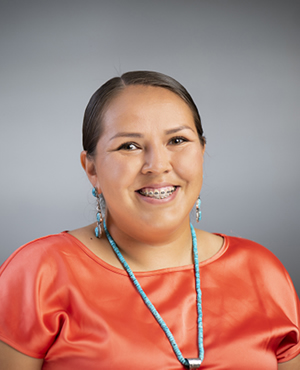
Kelly Beym
Yá’át’ééh! Shí éí Kelly Beym yinishyé. Táchii'nii nishłį́, Bilagáana bashishchiin, Tódích’íí’nii dashicheii, Bilagáana dashinalí. Ákót’éego diné asdzáán nishłį́. (Hello! My name is Kelly Beym. I am Red Running into the Water People Clan. In this way, I am a Navajo woman.) I recently graduated with a Bachelor of Individualized Studies with a minor in Agricultural Business Management. During the Spring of 2022, I interned with the Native American Agriculture Fund with a project focused on the equity of USDA Nutrition Programs serving tribal nations. I have a 10-year-old son and an 11-year-old daughter that I have been raising on my own for the past 10 years. I plan to continue onto a graduate degree that will provide me the knowledge necessary to utilize STEM to advocate for equitable policy impacting Indigenous communities. Fun fact: I am a certified baby cuddler! Prior to the pandemic, I volunteered at my local NICU with an Eat, Sleep, Console (ESC) program that utilized holistic healing methods for infants born with substance abuse dependencies. Substance abuse is a critical problem in Indian Country and this experience truly made me more empathetic to this as a societal problem rather than a personal one. It also heightened my desire to someday foster/adopt!
Poster "Every Buffalo Restored is an Indian Renewed: An Analysis of Tribal Buffalo Herd Management Practices and the Indian Buffalo Management Act"
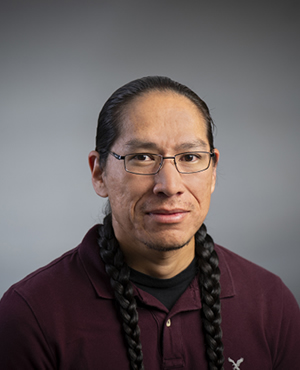
Timothy Denego
Northern Arapaho
Poster "Radioactive Roots: Big Sage Brush on the Wind River Reservation"
Haskell Indian Nations University
Business Administration
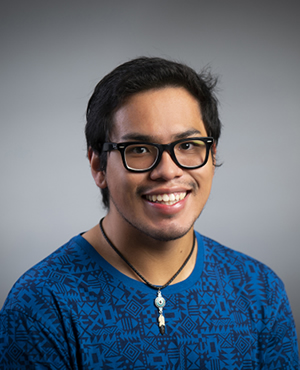
Nathaniel Fast Wolf
My name is Nathaniel Fast Wolf, my Lakota name is AwanunKasotapi, it was my great grandfather’s name. I am Itazipco and Mnicoju Lakota and I am also of the Seminole Nation of Oklahoma, Tusekia Harjo Band, Bear Clan. I’m from South Dakota, the Cheyenne River Sioux Reservation and I live in Eagle Butte, but my family originates from On The Tree, SD. I am preparing for my fourth year at the University of Minnesota Morris where I am pursuing a double major in Native American and Indigenous Studies (NAIS) and Anthropology and a minor in History. In my time as a HERS intern I really enjoyed the opportunity to learn about the variety of interests represented by my cohort, in addition to writing intensive coursework which will help me as a prepare to apply to graduate school. My project, “Dusting off Displacement: Environmental Removal of OK Indigenous after the 1930s Dust Bowl” examined the lack of Indigenous representation in migration of Okies from Oklahoma to California in the 1930s using an interdisciplinary study of Historical Anthropology, Native and Critical Media Studies, and Ecomigration.
Poster "Dusting off Displacement: Environmental Removal of OK Indigenous after the 1930’s Dust Bowl"
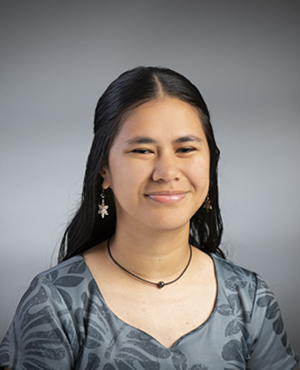
Talofa Fe'a
I am Talofa Fe’a, an Indigenous Pacific Islander and native Samoan from American Samoa— a mere dot on the world map, an archipelago located in the south-central Pacific Ocean. I am currently working towards an associate Natural Resources degree at the American Samoa Community College (ASCC), with aspirations to pursue a bachelor’s degree after graduation. Within the HERS Program, I gained new skills in goal setting, data collection, and cultural competence. Additionally, I was able to formulate a research proposal with the help of great HERS mentors, directors, and staff. My research design focused on investigating the cultural impact of climate-induced migration within the context of American Samoa and the 2009 tsunami case. In all honesty, HERS provided me with more than just a skill set and a graduate-level research proposal. I was gifted lifelong friendships, great memories, and profound respect for other native communities such as mine. I was constantly reminded to be unapologetically Indigenous in STEM and in life.
Poster "Eroding Ele’ele: A Qualitative Study of the Fa’aSamoa Impact of Climate Migration"
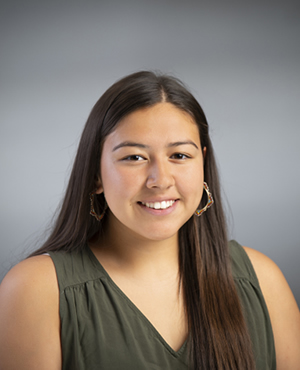
Celina Hall
Hanac hinįkaragiwi. Hocak raasura Wįįpamakereįga hįgaire. Maixete raasura Celinaga hįgaire. Hello, I greet you all! My Ho-Chunk name is Wįįpamakere, meaning “Rainbow”. My English name is Celina Hall. I am an enrolled member of the Ho-Chunk Nation Tribe of Wisconsin and affiliated with the Narragansett Tribe of Rhode Island. I was raised in Black River Falls, Wisconsin. I am currently going into my Junior year at the University of Kansas. I am pursuing my bachelors degree in Environmental Studies with a minor in Indigenous Studies. The summer after my senior year of High School I participated in a fellowship program with the Ho-Chunk Nation Department of Natural Resources (DNR). During that fellowship I found a passion working outside and gained a deeper understanding of different plants and animals within the area. As a Haskell Environmental Research Studies (HERS) intern, I have focused on developing my understanding of food sovereignty and food security and how these have been motives for community gardens and small-scale farming within my tribe. Through the HERS program I have developed a research proposal that requires 11 interviews each year over the next 5 years to help gain a better understanding on where the Ho-Chunk Nation stands as a whole and how growing our own food can help maintain our relationships with one another. After I graduate I want to go back home to work with the Ho-Chunk DNR or Agriculture department to incorporate what little I understand to help increase the development of these departments. I want to give back to the community and share my knowledge with them because I would not be where I am today if it weren’t for the Ho-Chunk Nation DNR fellowship.
Poster "Ho-Chunk Nation Community Gardening: A Conscious Effort at Reclaiming Traditions"
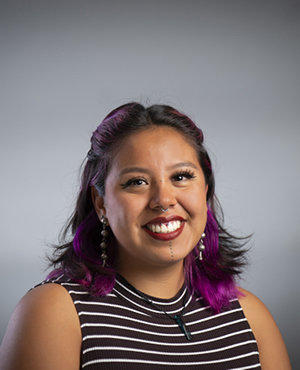
Pachynne Ignacio
My name is Pachynne Ignacio and I am a member of the Tohono O’odham Nation. Komckud E-wowsikt amjed, Komckud E-wowsikt cekasn ct. I’m currently enrolled at Northwest Indian College in Bellingham, WA; where I’ll be obtaining my bachelor’s in Native American Environmental Science. I am the mother to 3 fur babies, Clarence, Tabitha, and Sheila. I enjoy making art in my free time as well as running, reading, and watching horror movies. I plan to return to my community and start a non-profit that helps engage my community in conservation and restoration on our land.
Poster "Giving the Rain a Reason to Come: TEK-based Learning on the Tohono O'odham Nation"
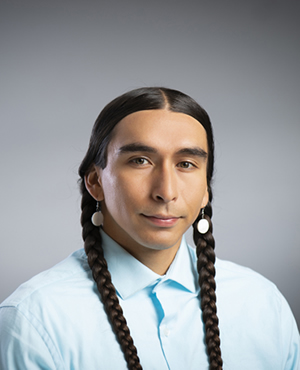
Steve Laravie Jr.
Hau Mitakuyapi, Damakota Isanti Oyate nahan Ponca Oyate hematanhan. Hello, my relatives, I come from the Isanti Dakota Oyate and the Ponca Oyate. My name is Steve Laravie Jr. and I am a recent Graduate from the Indigenous and American Indian Studies program at Haskell Indian Nations University. My work as an Undergraduate has been focused on the vitalization of Indigenous Reciprocity in our tribal communities, specifically within the communities of the Oceti Sakowin Oyate. The focus of the HERS Internship opportunity will be to advocate for the restoration of the Buffalo Nation in these communities, a relative that is necessary for the life of tradition, culture, and living. With traditional teaching and modern living, a bridge of connection is primary for the health of tribal communities. What the future may hold for this opportunity is a contribution to the implementation of gathered research. Brings the study to life by providing the means for this particular bond to sustain. While analyzing what has already been set forth for this action, what needs to be done, the history of the buffalo, their validity, and how the restoration efforts of the Buffalo can become a part of our realities of living as tribal people again.
Poster "Those Whose Dance Awakened Us: An Eco-cultural Relationship between the Isanti Dakota and Pte Oyate"
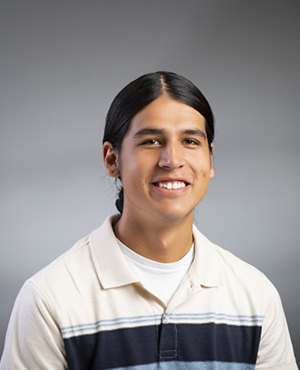
Willem Martin
My name is Willem Martin, and I am Hopi. I was raised in Phoenix, Arizona and currently attend Fort Lewis College in Durango, Colorado. At Fort Lewis College I am a senior currently pursuing a B.S. in Geology with a certificate in Geographic Information Systems. Outside of class I love to run, hike, occasionally read, and spend time outdoors. My current academic interests include Hydrology, Structural Geology, and the interactions humans have with the natural environment. I hope to attend graduate school in the future in a Geoscience field and obtain a master’s degree. The HERS program is important to me as it helped me understand the graduate school process, and the expectations and rigors graduate education requires.
Poster "It’s Heating Up: How the Salt River Pima-Maricopa Indian Community Reservation Impacts the Urban Heat Island Effect in Phoenix"
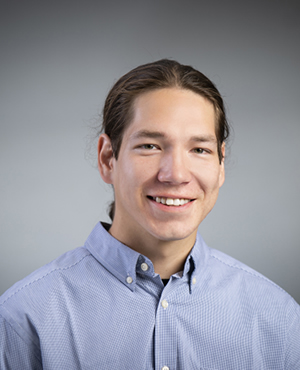
Jaylon Romine
My name is Jaylon Romine and I am enrolled member of the Muscogee (Creek) Nation but have Kiowa and Chickasaw ancestry as well. I am from a small town called Eufaula located in southeastern Oklahoma. I am currently a junior at Haskell Indian Nations University and am working towards my bachelors degree in Indigenous and American Indian studies. I plan on going to graduate school so that I can obtain a masters degree in Social Work and to become a Licensed Clinical Social Worker. I want to use this degree to go back home and help my tribal community as well as my family. I plan on using all of the skills I have learned in the HERS program throughout the rest of my academic journey and am very grateful for my time in this program because it was a nice introduction to the graduate level research experience.
Poster "Oil We Need Is Landback: How the Regulation of Oil is Changing on the Muscogee (Creek) Nation Reservation"
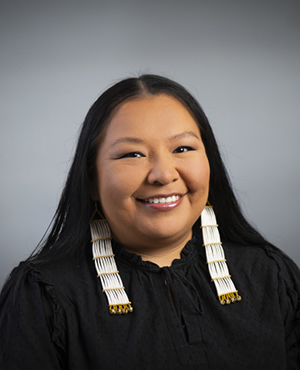
Alicia Swimmer
Alicia Swimmer, emaĉiyapi ksto. Nahan iyuha ĉanté wastéya napé ĉiyuzapé. (My name is Alicia Swimmer, and I greet you with a good-hearted handshake.) I am Siĉangu/Oglala Lakota and enrolled in the Rosebud Sioux Tribe. I was born and raised in Rapid City, SD and the Rosebud Indian Reservation. I graduated from Haskell Indian Nations University with a Bachelor of Science in Business Administration with an emphasis in Management. I will pursue a Master of Arts in Indigenous Studies at the University of Kansas. I am a non-traditional student and Ina (mother) to a son. I was raised by traditional Lakota families who firmly believe in upholding our nation's treaties with the United States. I am influenced by our traditional Lakota people, who understand how to protect our nation even without formal education. Growing up around our treaty councils and traditional leaders helped me choose where I wanted to go. As an intern at the Haskell Environmental Research Studies Institute, I focused my research on the water quality of Mni Ŝoŝé (Missouri River), which is the source of water piped through the Mni Wiĉoni Rural Water Project and the Rosebud Rural Water System to my reservation. I am concentrating this research on potential chemical contamination of the river due to spills from the fracking industry operating in the Bakken oil fields of North Dakota. All animals, plants, water, air, rocks, and soil deserve wiĉozani (total sense of wellbeing). Being a part of the policy-making process is how we Indigenous can protect the rights of all life forms on Unĉi Maka (Grandmother Earth). I look forward to continuing research to help preserve Indigenous lifeways through policy. Pilamayayé.
Poster "Wiĉozani?:Rosebud Reservation’s Drinking Water from Mni Šošé"
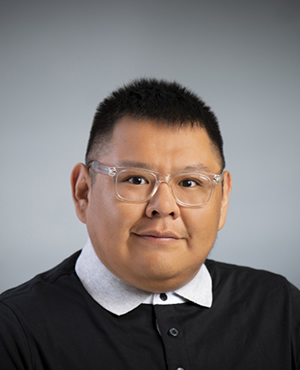
Christian Young
Yá’át’ééh my name is Christian Young. I am from Dilkon Arizona. My tribal affiliations are Navajo and Tewa. I am an environmental science student at Haskell Indian Nations University. My future goal is to attend medical school. I will enroll in an MD/PhD program with a focus on neuroscience. Computational neuroscience is the branch of neuroscience I want to study for my PhD research. The HERS internship has taught me many practical skills to use in my future endeavors, conducting research, working toward presenting a research poster, and writing a research proposal. I will place my participation in the HERS program as an experience for my resume and C.V. I hope to contribute to environmental science in the future in addition to practicing neurosurgery. I enjoy learning mathematics, playing soccer, training Brazilian jiu jitsu and boxing. I am an aspiring actor and singer. I assist Haskell Indian Nations University Women’s Volleyball as a student manager.
Poster "Iron Out Uranium: Using Zero Valent Iron Nanoparticles For Heavy Metal Remediation in Soil On The Navajo Nation"
